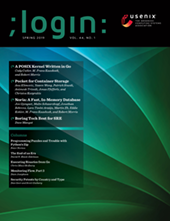
Python
;login: Enters a New Phase of Its Evolution
For over 20 years, ;login: has been a print magazine with a digital version; in the two decades previous, it was USENIX’s newsletter, UNIX News. Since its inception 45 years ago, it has served as a medium through which the USENIX community learns about useful tools, research, and events from one another. Beginning in 2021, ;login: will no longer be the formally published print magazine as we’ve known it most recently, but rather reimagined as a digital publication with increased opportunities for interactivity among authors and readers.
Since USENIX became an open access publisher of papers in 2008, ;login: has remained our only content behind a membership paywall. In keeping with our commitment to open access, all ;login: content will be open to everyone when we make this change. However, only USENIX members at the sustainer level or higher, as well as student members, will have exclusive access to the interactivity options. Rik Farrow, the current editor of the magazine, will continue to provide leadership for the overall content offered in ;login:, which will be released via our website on a regular basis throughout the year.
As we plan to launch this new format, we are forming an editorial committee of volunteers from throughout the USENIX community to curate content, meaning that this will be a formally peer-reviewed publication. This new model will increase opportunities for the community to contribute to ;login: and engage with its content. In addition to written articles, we are open to other ideas of what you might want to experience.

This column is being written in December, which ends another year, which brings end of year holiday plans, deadlines (like the one for this column), and a chance to challenge yourself to do something different before the year is fully out and done.
For my part, over the last few years I’ve had a great time participating in the annual Advent of Code (adventofcode.com), which is a great way to take a break from work where you have to solve problems on a deadline, and... well, solve problems on a different deadline. But for fun.
It’s a great opportunity to learn more about your preferred language, to try out a new language, or revisit how things work in a language you haven’t used in a while. You can also compare notes with others and see how different languages can give you the tools you need (or how hard it is to build them from scratch if that’s more to your taste).
